|
TRANSLATE THIS ARTICLE
Integral World: Exploring Theories of Everything
An independent forum for a critical discussion of the integral philosophy of Ken Wilber
 Brad Reynolds did graduate work at the California Institute of Integral Studies (CIIS) before leaving to study under Ken Wilber for a decade, and published two books reviewing Wilber's work: Embracing Reality: The Integral Vision of Ken Wilber (Tarcher, 2004), Where's Wilber At?: Ken Wilber's Integral Vision in the New Millennium (Paragon House, 2006) and God's Great Tradition of Global Wisdom: Guru Yoga-Satsang in the Integral Age (Bright Alliance, 2021). Visit: http://integralartandstudies.com Brad Reynolds did graduate work at the California Institute of Integral Studies (CIIS) before leaving to study under Ken Wilber for a decade, and published two books reviewing Wilber's work: Embracing Reality: The Integral Vision of Ken Wilber (Tarcher, 2004), Where's Wilber At?: Ken Wilber's Integral Vision in the New Millennium (Paragon House, 2006) and God's Great Tradition of Global Wisdom: Guru Yoga-Satsang in the Integral Age (Bright Alliance, 2021). Visit: http://integralartandstudies.com
The Great Wisdom Tradition's Divine LibraryBrad Reynolds
Our knowledge quest today, therefore, is about integrating these wisdom treasures from all sources and cultures.
To successfully negotiate the developmental processes of the First Three Stages of Life (to human maturity) is the gateway for entering the higher transpersonal stages of consciousness evolution (beginning with the Fourth Stage of Life). Ultimately, this requires a spiritual lifestyle and disciplined practice, preferably under the guidance of qualified teachers and a genuine Guru. In the past, the foundational stages of life were matured by the ethics and morality provided by the mythologies and religious lore of a society and its elders. Cultural myths and traditional religions, in most cases, are basically forms of social control promoting the development of morality and that society’s ideals (when successful). This is unquestionably a necessary function, but inadequate for complete human maturity to Enlightenment (or God-Realization). In other words, we must evolve beyond the religious myths to be Enlightened or know God for real.  Gaining access to the storehouse of knowledge provided by traditional cultures in their observance of human growth, accumulated from millennia of history, is an important guide to future human maturity, even in the modern world. In other words, we can’t entirely divorce ourselves from our mythic heritage, even if we must transcend and integrate it. In this case, mythic (and magical) thinking needs to adequately evolve into mysticism; religious beliefs evolve into spiritual experience, rational thinking into ecstatic self-transcendence. Our knowledge quest today, therefore, is about integrating these wisdom treasures from all sources and cultures, for altogether they are our collective inheritance of One “Great Tradition” of Humanity bequeathed to all of us from our wisest ancestors, regardless of our born cultural heritage. Yet, even then, the Enlightened Sages should always be the ones pointing the way to our further growth, not just religious leaders or mythic believers, and certainly not science and technology alone. Perhaps one of the most fortuitous discovers of modern scholarship has been the affirmation that there is a “Perennial Philosophy” — an “ever-repeating” philosophia — a set of core doctrines that appears in most spiritual traditions. Many scholars have noticed a universal wisdom running throughout the essence of all world religions and spiritual paths, though they still like to debate about it (with no unanimous consensus). Nonetheless, when you look beyond cultural variations (what Ken Wilber calls “surface structures”), or even the degree of realization of any one advocate, there are certain universal truths that seem to shine forth (from what Wilber calls “deep structures”). For instance, some of the fundamental doctrines of the Perennial Philosophy state there is a Supreme Reality, or God (or Divine Ground), that is paradoxically transcendent (beyond all forms) and immanent (pervading all forms); that humans are capable of attaining immediate knowledge of that Divine Ground, and we are of a dual nature, i.e., containing both a phenomenal ego (self) and eternal Self (Atman); the purpose of human life is to know God, and there is a path (or paths) to attain wisdom of our Supreme Identity.[1] These are values that would serve us all in our new emerging era of global unity, regardless of religious preference. 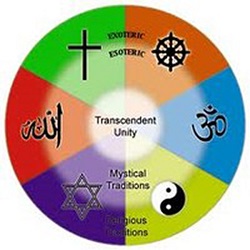
This “timeless” philosophy — the “Wisdom of the Ages,” so to speak — has been designated “perennial” by scholars for it repeats or reoccurs throughout human history, simply because it’s a collective manifestation of the inner nature or core of the human psyche. Hence, integral philosopher Ken Wilber has explained, “There is a much more sophisticated view of the relation of humanity and Divinity, a view held by the great majority of the truly gifted theologians, philosophers, sages, and even scientists of various times…. It forms the esoteric [or inner] core of Hinduism, Buddhism, Taoism, Sufism, and Christian mysticism, as well as being embraced, in whole or in part, by individual intellects ranging from Spinoza to Albert Einstein, Schopenhauer to Jung, William James to Plato.”[2] Although modern academia, particularly comparative religious studies, has written about the Perennial Philosophy from the modern perspective, the idea first arose whenever educated and wise individuals in the past had access to some of the world’s diverse spiritual teachings. For example, ecumenical centers like Alexandria in ancient Egypt gave birth to the idea that spiritual truths were in essence the same, but were only cloaked in different cultural expressions. The great Alexandrian Library was said to contain all the sacred teachings of the ancient world (which, sadly, were tragically destroyed in a fire started by Christian zealots). Other cosmopolitan centers, such as the illustrious Academy of Jundishapur in ancient Persia, or Plato’s Academy in Athens, generally came to similar conclusions: deep in our hearts spirituality is universal and wisdom is One. After the “Dark Ages” when Europe became illiterate, her “rebirth” or Renaissance was stimulated by Arabic-Persian scholars who had saved many of the ancient teachings, including those of the Greeks (such as Plato collected works), so that a new generation of humanist philosophers, such as Pico della Mirandola, Marsilio Ficino, and Agostino Steuco, began to assert a “pious philosophy” that united humankind beyond any one religion (including the dominant Christian tradition of the time). The postmodern historian Richard Tarnas, in The Passion of the Western Mind (1991), explained the eclectic quality of universal wisdom being uncovered by the Renaissance Humanists: The Humanist’s suddenly expanded reading lists gave evidence of a tradition of learning, of intellectual, spiritual, and imaginative insight, that found expression not only in the classical Greeks, but throughout civilized history— in the Hermetic corpus, in Zoroastrian oracles, in the Hebrew Kabbalah, in Babylonian and Egyptian texts—a cross-cultural revelation that bespoke a Logos [Divine Wisdom] that manifested itself continually and universally.[3] The “Perennial Philosophy” of Renaissance Platonism acknowledged a pedigree stretching back to Orpheus and Zoroaster (nearly a thousand years before Christ) so that it flourished throughout the 16th century alongside the dominant Aristotelian and scholastic philosophy. This, in part, helped stimulate the Western Enlightenment, for the awareness of a Perennial Philosophy, which seemed to transcend any particular cultural worldview, lended support and authenticity to the emerging humanism being championed among the contemporary philosophers of that period. Apparently it also influenced the 17th century German mathematician-philosopher Gottfried Leibniz (1646-1716), who wrote about a “philosophia perennis,” which the British novelist Aldous Huxley (1894- 1960) credited as being the originator of the term.[4] He wasn’t far off. 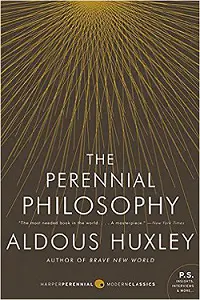
It was Huxley who made the phrase popular and known throughout the Western world with the publication of his scholarly book The Perennial Philosophy (1944). Published at the height of World War II, the author of the prophetic novel Brave New World (1932), wrote this book in response to the tragedy of another horrific world war in an attempt to show how humankind was truly united even in its deepest beliefs and philosophies, beyond any one culture’s superior status. Inspired by his decades-long investigations into Eastern mysticism and world religions, The Perennial Philosophy meticulously illustrates the basic themes of a universal spirituality expressed in a diverse collection of spiritual texts and great teachers that Huxley had gathered from around the world to comment on with erudite insight. In summary, Huxley saw that “the Perennial Philosophy and its ethical corollaries constitute a Highest Common Factor, present in all major religions,” and that “rudiments of the Perennial Philosophy may be found among the traditional lore of primitive peoples in every region of the world, and in its fully developed forms it has a place in every one of the higher religions.”[5] Numerous scholars have promoted this general idea of a universal spirituality before and since, beginning most clearly in the Renaissance, yet it’s given its deepest articulation with the comparative religion scholarship of the 20th century expressed by some of its brightest minds. 
The notable and highly-respected scholar of world religions, Huston Smith (1919- 2016), author of the popular The World’s Religions: Our Great Wisdom Traditions (1958, 2009), advocated that the Perennial Philosophy is the “winnowed wisdom of the human race,” since, he claims, it’s based on “the world’s religions at their best.”[6] Consequently, Smith also frequently inserts the title “The Great Wisdom Traditions” in place of “Perennial Philosophy,” while also acknowledging it is a “Primordial Tradition,” since all human cultures and worldviews, from tribes to civilizations, from myths to mysticism, each make their own unique contributions to human wisdom. Based on his Enlightened perspective, thus uninfluenced by these scholarly views, Avatar Adi Da was one of the first to use the term “Great Tradition” or “The Great Tradition of Humankind” to denote this collective wisdom of humanity. The Perennial Philosophy, in other words, is a global wisdom tradition bequeathed to each new generation linking us all together in a tolerant embrace of spiritual unity, if we take the time to study it and learn its content. See, for example, Huston Smith’s mandalic diagram (which I helped reconstruct for him in graphic form) that shows the basic levels or structures comprising Reality and selfhood (or ontology and epistemology, respectively) recognized by the world’s Great Wisdom Traditions or Philosophia perennis as pictured below: With this larger, universal understanding, as integral philosopher Haridas Chaudhuri (1913-1975) points out, “no sacred scripture of any particular religion can be regarded as an exhaustive revelation of the absolute truth…. The spiritually integrated individual advances from the particularity of religious faith in which he or she was born to the universality of the spiritual outlook as the full flowering of their faith.”[7] 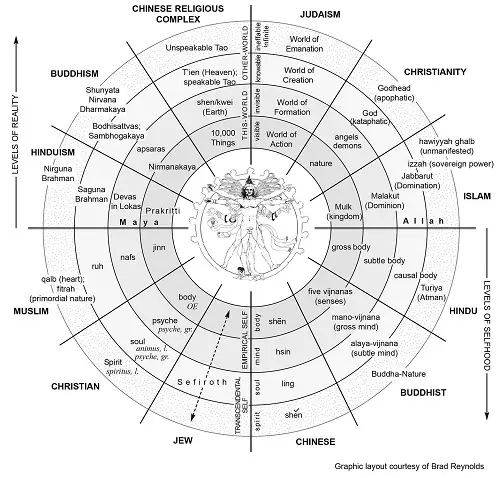
Huston Smith’s Great Nest of World Religions — Philosophia perennis
This is why, for example, another respected scholar of the Perennial Philosophy, Seyyed Hossein Nasr suggested, “Perhaps it would here be better or more prudent to speak of a ‘Sophia perennis’ [or a perennial enlightened awareness].”[8] Philosophy, in other words, is built around intellectual concepts that are, at best, trying to teach us about spiritual revelations and an intuitive understanding that far transcends rationality itself or the purely mental function of knowledge. This insight, as another example, led the German-Swiss perennialist Frithjof Schuon (1907-1998), author of the profound The Transcendent Unity of Religions (1953), to make a clear case that “the transcendent unity of religion” is best embodied in the esoteric (or “inner”) teachings, more so than with the exoteric (or “outer”) institutionalized traditions.[9] The true “transcendent unity of religions,” Schuon argued, “means that the unity of the religious forms must be realized in a purely inward and spiritual way without prejudice to any particular form.”[10] Adi Da also asserts “if we go to school with the Great Tradition, we must go through a trial of self-transformation.”[11] What’s “perennial,” in other words, is not really a philosophy, per se, but a spectrum of realizations and an Awakening based on spiritual practice (or sadhana) which are necessary steps to initiate the evolution of consciousness into the Higher Stages of Life — the true goal of the Perennial Philosophy. 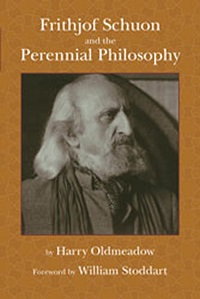
This esoteric wisdom, therefore, is ultimately realized inwardly by each individual (via the evolution of consciousness), which is only gained via authentic spiritual practice and ego-transcendence. As such, it transcends egoic self-identification and any provincial exoteric religious forms, even though when properly used they may serve us on the path leading towards sophia or Divine Enlightenment. Since such profound spiritual wisdom emanates from the collective inner psyche of human beings, it also reveals a global unity found in the depths of humanity, which is exactly why Integral Psychology appeals to its inclusion within an overall model presenting the full-spectrum of reality grounded in the highest possibilities of human consciousness. Integral psychologist Ken Wilber, therefore, has also been a major proponent of the Perennial Philosophy using it to support many of his major theses since his very first writings. In fact, Wilber’s first published articles introduced the idea of a psychologia perennis or a “Perennial Psychology” based on a “spectrum of consciousness” (the title of Wilber’s first book).[12] These first published words of Ken Wilber wonderfully summarize transpersonal psychology’s love of the Perennial Philosophy: “Corresponding to the perennial philosophy there exists what I would like to call a psychologia perennis, a ‘perennial psychology’—a universal view as to the nature of human consciousness, which expresses the very same insights as the perennial philosophy but in a more decidedly psychological language.”[13] The Perennial Philosophy had been the theoretical backbone for the first several decades of Wilber’s writings and theories, especially since he concluded human development culminates in God-Realization (a major assertion of Philosophia perennis). Nevertheless, Wilber has also become a harsh critic of many “Perennialists” or writers defending the Perennial Philosophy (such as Guénon, Schuon, Smith, et al), since he believes they have not adequately integrated the modern idea of evolution into their “timeless” philosophy. Hence, the integral pandit initially evoked a “Neo-Perennial Philosophy” (back in 1983) to account for his shift in views, as he later explained: “My approach to the Perennial Philosophy has been to try to take up and preserve those abiding truths that are as significant today as when they were first discovered, and then integrate them with the newly emerging truths of modernity and postmodernity.”[14] Yet, in the end, it's still the same Perennial Philosophy in a new post-postmodern garb. More recently, the integral pandit has provided a strong critique of the “metaphysics” of the Perennialists by claiming they assume the “planes” or “levels” of Reality are pregiven (and thus not subject to evolution), hence Wilber has developed an “integral post-metaphysics” to buttress his point of view. However, these strong critiques are simply Wilber’s “post-postmodern” perspective, and thus do not really diminish the authenticity of the Perennial Philosophy itself or their core doctrines (e.g., we are all God regardless if we are evolving or not). By taking such a strong stance, I believe in this way Wilber has actually harmed our progress in spiritual understanding (but these are philosophical arguments best reserved for other venues). 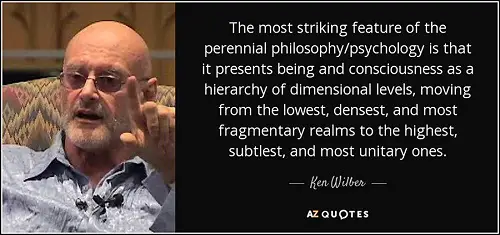 The universal proclamation of an eternal wisdom tradition circling the globe and spanning the centuries, arising in every generation, has become increasingly popular in recent times, especially since the postmodern turn of the 1960s. In fact, it is a natural consequence of international travel, global communication networks, and the worldwide linking of people and cultures like never before in human history. Yet, it is only in tolerant societies supporting free-thinking and open-mindedness, and with fairly easy access to information sources, that the Perennial Philosophy has been clearly recognized, whereas historically, it’s generally only been entertained by a select few, usually scholars. In any of the world’s societies where free thought and education is suppressed, the Wisdom Traditions also become hidden and “secret” knowledge. It is our moral duty, therefore, to always prevent this oppression of free thought and religious freedom, and make the Great Wisdom Tradition available to all (now and forever hereafter). In response to our emerging global culture, the American-born Adept Adi Da Samraj, the first Western Avatar to appear in human history, affirms that it is now time to move beyond all provincial cultural prejudices, for, in his words, “The Great Tradition must be accepted as our common inheritance.” The title “Great Tradition” was first coined by Adi Da when it appeared in his books and talks in the late 1970s and early 1980s. He defined it as “the common Wisdom-Inheritance of humankind,” which includes the total collection of the world’s wisdom, from the most basic knowledge about living life (e.g., exercise, diet, health, sexuality, human maturity, etc.) to the esoteric wisdom inherent in the various approaches to human spirituality, from shamanism to yoga to mysticism, etc. In this way, he has used the “Seven Stages of Life” Model to explain and discriminate the various levels of mysticism and God-Realization in the “Great Tradition” of humankind. The Great Tradition is specifically defined as “the total inheritance of human cultural, religious, magical, mystical, spiritual, Transcendental, and Divine paths, philosophies, and testimonies, from all the eras and cultures of global humankind—which inheritance has (in the present era of worldwide communication) become the common legacy of humankind.”[15] Because we are now an emerging global culture, Adi Da teaches that each born human being has an innate right to access this vast storehouse of wisdom-knowledge, for it is, in fact, our “common inheritance” as a living human born on this planet Earth. This is why it can also be called “The Great Tradition of Global Wisdom,” or “The Great Human Tradition,”[16] among other notable monikers. 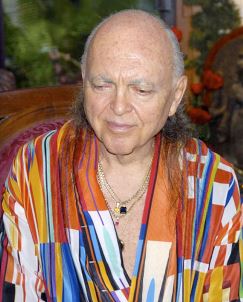
As an Enlightened Adept, Sri Adi Da has made a universal call for everyone to abandon their “tribalism” (or cultural provincialism) and to accept and study this worldwide “Great Tradition,” first as a means to overcome his or her cultural and religious prejudices, and second, as an inspiration for their own spiritual practice. Such sacred study, supplemented with real spiritual disciplines, would also counter the modern tendency to secular materialism. In addition, he claimed, we will also come to better understand the unique function of Spiritual Masters and genuine Gurus, or all the Adepts who were born to serve other people’s awakening to Enlightenment. For example, it’s easy to see how an actual person, a living Adept- Realizer (in the Higher Stages of Life), has always been the root-source for every world religion and spiritual path in human history. Adi Da further explains this fortuitous advantage in coming to know and study the Great Tradition of the world’s wisdom as a whole: What I call the “Great Tradition” is that entire mass of traditions, reflecting all of the seven stages of human existence [the Seven Stages of Life], that is the common inheritance of all of humankind in this time of universal communication, interrelatedness, and interdependence. It is no longer appropriate or even possible for individuals, cultures, or nations to justify absolute independence from other individuals, cultures, or nations—and it is no longer appropriate or possible to grant absolute or ultimately superior status to any historical Revelation, belief system, or conception of how things work. The entire Great Tradition must be accepted as our common inheritance…. I call for the universal acceptance of the Total Tradition (or Great Tradition) of humankind as the common inheritance of humankind.[17] According to Bhagavan Adi Da, the Great Tradition needs to be taken altogether, as a whole, for it presents a “Grand Argument” gathered from all the world’s wisest beings. In this manner, the Great Tradition provides us with a “truly human culture, practical self-discipline, perennial religion, universal religious mysticism, ‘esoteric’ Spirituality, and Transcendental Wisdom” that the world needs to fulfill our human potential and evolutionary destiny. This approach includes all religions, “the transcendent unity of religions” (as Schuon noted above). By studying or “listening” to this “Grand Argument” with diligence, as well as with discrimination (and understanding), we can “hear” (or truly comprehend) its summary message, which, in essence, is exactly the same as the fundamental “doctrine” of the Perennial Philosophy: Tat tvam asi — “That Thou Art” — you are God! The whole point of the Great Tradition, in other words, is not simply to become scholars of different cultural texts or traditional viewpoints, but be motivated to do ego-transcending spiritual practices (sadhana) and realize for ourselves what our wisest ancestors have also Realized: God Only, Only God. As the Buddhists say, this path cultivates both compassion (from the heart) and wisdom (from the mind), together, as one integrated human existence. By placing an added emphasis on our common sacred legacy as the human race, the Sat-Guru also calls our attention to the critical importance of transcending the limitations of living of a secular society entrapped by the philosophy of scientific materialism, as well as our tendency toward parochial religious prejudice. Adi Da pointed this out in a talk on the “Great Tradition” spontaneously given in 1983: At this point in history we are all the inheritors of the Great Tradition, the Total Tradition, and we should acknowledge this. It is useful and important for humanity to acknowledge this Great Tradition, the Great Sacred Tradition, the Great Wisdom Tradition, to become free of religious provincialism, cultural provincialism, and so forth, but also be free of the secular mode of society in our time. In acknowledging this Great Tradition we cease to be provincial religiously, but we also cease to be merely secular, pagan, or barbaric.[18] Having a Realized Adept who has been alive during modern times and recent history, and who has thus critically reviewed the entire span of world history, gives us all, no matter our country of origin, a unique advantage in being able to understand and then position human history within an enlightened context. People’s political, economic, social, and educational opportunities often don’t provide the full spectrum of this wisdom-knowledge, although the resources are now available, including on the Internet, to make its distribution more accessible to all the world’s people, no matter what culture or country they were born into and now live. The Great Wisdom Tradition is our right as spiritual beings born as humans. Yet, it’s still every person’s responsibility to become familiar with this sacred inheritance and then cultivate its higher ideals and evolutionary potentials. It is a task of study that reveals our prior unity and our true existence as One Humanity, as One Divine Reality, and is thus intended to brighten our future to God knows where. 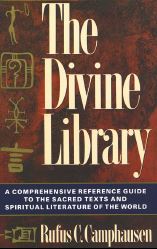
In today’s new millennium, with the continued popularity of humanistic, transpersonal, and integral psychology, coupled with a keen interest in comparative world religions, there has been a growing awareness of the underlying spiritual (as well as biological) unity of humankind. Although traditional religions may be waning in popularity, true spirituality itself will always thrive, even in the halls of science and materialism — for, after all, it is perennial and always already present in our human hearts and psyche. In addition, another great advantage is that with modern communication technology and multimedia, ranging from the printed word to publishing houses to digital recordings to the Internet, to seminars and meditation retreats, we may now buy nearly any esoteric text from any one of the world’s major (and minor) religions, a rich resource of knowledge that’s been cleverly named the “Divine Library,”[19] a compendium to the sacred literature of the world, our common inheritance. Indeed, this global wisdom shows we are united not only in biology (a proven scientific fact) but also in the deep structures of our thought and mind, our psyche and soul (while being holistically grounded in nondual Spirit). To assist in our study of humanity’s Great Wisdom Tradition, which is extensive in size, with more volumes being published every year, Avatar Adi Da has provided an enormous text called The Basket of Tolerance (still unpublished) where he has placed thousands of books and scholarly translations (and commentaries) within the framework of the Seven Stages of Life Model. This is an incredible guide to a deeper understanding of the world’s greatest literature and most sacred teachings — and a great goad to your own Growth In God. 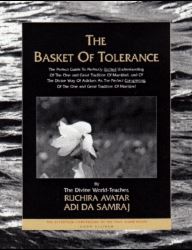
Such an extensive or even cursory study of the Great Tradition’s wisdom will also generate, according to Adi Da, a “culture of tolerance,” for then people will allow all historical and provincial views to exist within a developmental spectrum of consciousness (or the “Seven Stages of Life”). This means, as the Adept clarifies: “No one part of the ‘Great Tradition’ is sufficient by itself,” therefore, true wisdom must be seen as a global phenomenon, not the province of any one religion or tradition. When this is clearly understood and honored, then, as Adi Da continues, “No one tradition among many, no one traditional text among many, and no partial group of traditions and traditional texts is sufficient or of exclusively ultimate importance.”[20] All sacred texts and mystical revelations by women and men alike are to be honored, but none exclusively — “All the ‘Holy Books’ are our books, and all of us must go to school and be transformed in our minds by the Great Tradition.”[21] Then we can relax our cultic or provincial preference for any one religious tradition or teacher over another, and thus “learn the lesson of tolerance,” by embracing all the world’s people and their unique cultural traditions by seeing their unity in depth. At times, it may seem to you (or anyone) that one tradition or wisdom text, or even any particular Adept, is “necessary, sufficient, and even absolute,” for it has a personal importance to you or your stage of spiritual growth. Nonetheless, that text, or person too, occurs within a global and historical context as being only one among many, though some are more Enlightened than others (as the Seven Stages of Life shows). This alone should motivate a person to be respectful and tolerant of other people’s development and religious worldviews, opening a door to discover the authenticity of the world’s wisdom buried within the sacred libraries of our wisest ancestors in the long history of the Great Tradition. May we all be blessed to embrace and learn from our Great Tradition of enlightened human wisdom, whenever we’re born, wherever we live. NOTES[1] See: Aldous Huxley, "The Minimum Working Hypothesis," in Vedanta for the Western World (Hollywood: Vedanta Press, 1945), edited by Christopher Isherwood. [2] Ken Wilber, Up From Eden (1981), p. 2. [3] Richard Tarnas, The Passion of the Western Mind (1991), p. 213. [4] Recent scholars have corrected Huxley's assertion that Leibniz originated the term "Perennial Philosophy" (philosophia perennis), such as Seyyed Hossein Nasr in Knowledge and the Sacred (1989), p. 69: "Contrary to Huxley's assertion, the term philosophia perennis was not employed first by Leibniz who did quote it in a well-known letter to Remind written in 1714. Rather, the term was probably employed for the first time by Agostino Steuco (1497-1548), the Renaissance philosopher and theologian." [5] Aldous Huxley, The Perennial Philosophy (1944, 1970), p. vii. [6] Huston Smith, The World's Religions (1991), p. 5. [7] Haridas Chaudhuri, The Evolution of Integral Consciousness (1977), p. 20. [8] Seyyed Hossein Nasr, Knowledge and the Sacred (1989), p. 88, 18n. [9] See: Frithjof Schuon, The Transcendent Unity of Religions (1957, 1984). [10] Frithjof Schuon, The Transcendent Unity of Religions (1984), p. xxxiv. [11] Adi Da Samraj, Nirvanasara (1983), p. 200. [12] See: Ken Wilber, "Psychologia perennis: The Spectrum of Consciousness" in The Journal of Transpersonal Psychology, Volume 7, No. 2, 1975. [13] Ken Wilber, "Psychologia perennis: The Spectrum of Consciousness" in The Journal of Transpersonal Psychology, Volume 7, No. 2, 1975, p. 105. [14] Ken Wilber, The Collected Works of Ken Wilber, Volume 4 (1999), "Introduciton," p. 12. [15] See: The Gnosticon (2010) by Adi Da Samraj, "Glossary," p. 968. [16] See, for example, Streams of Wisdom: An Advanced Guide to Integral Spiritual Development (2014) by Dustin DiPerna, who has become a strong advocate for the Great Wisdom Tradition seen within the integral framework. [17] Adi Da Samraj, Nirvanasara (1983, Middletown, CA: Dawn Horse Press), pp. 198-199. [18] Adi Da Samraj, from the talk "The Great Tradition," January 22, 1983 (unpublished). [19] See, for example, The Divine Library: A Comprehensive Reference guide to the Sacred Texts and Spiritual Literature of the World (1992) by Rufus C. Camphausen; or The World's Wisdom: Sacred Texts of the World's Religions (1994) by Philip Novak, a companion book to Huston Smith's The World's Religions (1958, 1991). [20] All quotes in paragraph from Ad Da Samraj in "Preface: The Gathering of the Seven Schools of God- Talk" in The Basket of Tolerance (forthcoming). [21] Adi Da Samraj, Nirvanasara (1983, Middletown, CA: Dawn Horse Press), p. 199.
|